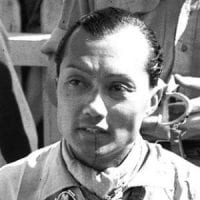“B.Bira” was one of the most famous, charismatic and colourful characters to have graced the British racing scene. His results may not have been particularly remarkable, but his wealth and position as a Prince of Siam ensured added fame. However, when he died in 1985 at a London Underground station he was penniless and unrecognised.
Childhood and pre-war racing career
The grandson of King Mongkut, who was later immortalised by Yul Brynner in the The King And I (1956), the young Birabongse was sent to England in 1927 to be educated at Eton College. It was here that he gained his pseudonym as the school matron unable to pronounce his surname. “Bira” started racing while an undergraduate at Cambridge University, initially with a Riley Imp and MG Magnette from 1935.
But it was with his blue and yellow ERA B-types that his career took off. “Romulus” (R2B) and “Remus” (R5B) are two of the most recognisable voiturettes of the time – still running today and now worth a fortune. The former was a 21st birthday present from his cousin Prince Chula Chakrabongse and “Bira” finished second at Dieppe in his first race with the car.
With Chula directing his racing affairs under the White Mouse banner, any thoughts of another playboy racer were soon forgotten – “Bira” was a star and fast with it. He was ERA’s most successful driver in 1936 – narrowly beating Raymond Mays in the International Trophy at Brooklands, avoiding first-lap carnage to win the Rainier Cup in Monaco and scoring subsequent victories at Péronne and Albi.
Two Delages were purchased for 1937 (including the famous ex-Richard Seaman car) but it was an unhappy switch, stretching even his finances as they struggled to develop the cars. But he won the RAC Light Car Race at Douglas on the Isle of Man with “Romulus” and acquired a Maserati 8CM from Whitney Straight which was successful in the Campbell Trophy at Brooklands and London Grand Prix at Crystal Palace. But when the mighty German teams arrived for the 1937 Donington GP, no British-based driver could compete. “Bira” finished as “best of the rest” in sixth position with the Maserati.
The troublesome Delages were replaced by an ERA C-type and he won at Cork in 1938 and the 1939 Nuffield Trophy at Donington. The old-fashioned, upright car was no match for the new Italian voiturettes however. Lightly injured at Reims, his achievements had already been rewarded with the BRDC Gold Star in 1936, 1937 and 1938.
World War II and the 1940s
He served in the Home Guard in Cornwall during World War II and raced again in 1946. The sparkle of his early victories may have gone but he did win three of his four races in a works Simca-Gordini voiturette during 1947. He also drove Chula’s Maserati 4CL to victory in the 1947 GP des Frontières at Chimay and in the following year’s inaugural race at Zandvoort.
The 1949 season almost provided “Bira” with a first victory in a major GP. Second at Perpignan, Albi and Reims, he was third in the Italian GP. Victory was within his grasp in that year’s British GP but he crashed his Maserati 4CLT/48 at Silverstone’s Club chicane while in a secure lead.
The World Championship years
“Bira” drove Enrico Platé’s 4CLT/48 during 1950 and qualified fifth for the first world championship GP at Silverstone. He ran strongly before retiring but points scores at Monaco (fifth) and in Switzerland (fourth) were rewarded by eighth position in the 1950 standings.
He only started one GP in 1951 but he did win Goodwood’s Richmond Trophy – his Maserati now powered by an OSCA V12 engine. Two disappointing Formula 2 seasons followed with a works Gordini (1952) and HWM, Maserati and Connaught a year later – fourth in the 1953 International Trophy his best result.
Now entering his forties and with his competitive edge on the wane, “Bira” started 1954 with a Maserati A6GCM fitted with a new 250F engine. Inspired in Silverstone’s International Trophy only to retire from the final, he did win again at Chimay. He then bought a new 250F chassis and equaled his best GP finish when fourth in the 1954 French GP. Second-place finishes in non-championship races at Rouen and Pescara confirmed a late upturn in form.
Retirement and later life
Victory in the 1955 New Zealand GP and third position in the International Trophy were his last noteworthy successes before “Bira” abruptly retired from the sport. He later became an Olympic yachtsman and respected sculptor, but ultimately he died a lonely death.
With his vast fortune spent, he suffered a fatal heart attack at Baron’s Court tube station just two days before Christmas Day 1985. Without any identification – “Bira’s” death was only announced after translation of a letter found in his pocket.


